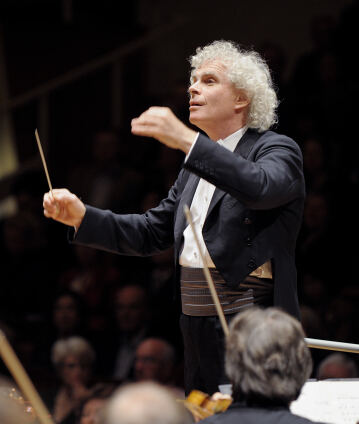Simon Rattle conducts Messiaen’s “Turangalîla-Symphonie”

Olivier Messiaen’s Turangalîla-Symphonie is truly cosmic music: mystical, powerful, full of cascading winds and velvety strings, with the glittering electronic sounds of an ondes Mmartenot. There is also a complex, highly virtuosic piano part, which was played by none other than Pierre-Laurent Aimard in this concert. The Berliner Philharmoniker were conducted by Sir Simon Rattle.
Hardly any other composer combines as many contradicting elements in his works as Olivier Messiaen. Inertia and dynamic force, deep piety and passionate sensuality, highly complex rhythmic structures and exuberant melodies, esoteric design principles and tremendous popular appeal are juxtaposed in his music. Messiaen is thus regarded as the most important French composer between Claude Debussy and Pierre Boulez, who studied with him.
The Turangalîla-Symphonie, the premiere of which was conducted by Leonard Bernstein in Boston in 1948, is Messiaen’s best-known work and features an ensemble typical of him. The large, dazzling symphony orchestra is augmented by an often percussive piano and the distinctively iridescent sounds of the ondes Martenot, one of the first electronic musical instruments.
The symphony, whose title comes from ancient Indian Sanskrit, comprises ten movements connected by recurring themes and depicts Messiaen’s exploration of a love that exceeds all earthly limits and leads to death. It is the central instrumental work of the composer’s Tristan trilogy and is framed by two vocal works. In this concert Sir Simon Rattle and the Berliner Philharmoniker prefaced the work with the orchestral version of the Prelude and Liebestod from Wagner’s opera Tristan und Isolde. The concert took place as part of Musikfest Berlin, which dedicated a programme focus to Messiaen on the 100th anniversary of his birth.
© 2008 Berlin Phil Media GmbH
Artists
Our recommendations
- Pierre Boulez and Pierre-Laurent Aimard with works by Ravel, Bartók and Boulez
- An “American Evening” with Ingo Metzmacher and Pierre-Laurent Aimard
- Schoenberg’s Piano Concerto with Pierre-Laurent Aimard and Jiří Bělohlávek
- Jonathan Nott and Pierre-Laurent Aimard
- François-Xavier Roth and Pierre-Laurent Aimard
- Simon Rattle conducts symphonies between late Romanticism and Modernism